College is a time for students to be exposed to new and exciting experiences. For many students who came to North Carolina from out of state, this fall is exposing them to something totally new: what it’s like to live and vote in a campaign battleground state.
In what is shaping up to be an election decided on the margins, winning North Carolina’s 16 electoral college votes would be a major boost for either candidate in the race to 270. With 132 institutions of higher learning in the state, the election could very well be decided on college campuses.
Caleb Pembele, junior at Wake Forest University, moved to the south for college from the midwest. His hometown of Normal, Ill., doesn’t tend to attract much foot traffic on behalf of campaigns, as the state has voted for a Democrat in the presidential election for the last 20 years.
This year, however, as president of Wake Forest University Democrats, he has had the opportunity to meet almost all of the key candidates on the Democratic ticket with the exception of Vice President Kamala Harris, who he has seen at rallies across the state.
Carolina in My Mind
Both campaigns are focused on North Carolina as one of the seven swing states that could decide the election, which is why in the final weekend before the election, both Vice President Kamala Harris and former President Donald Trump, as well as their running mates, are making multiple stops across the Tar Heel State.
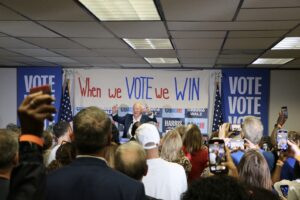
This past week, Vice Presidential candidate and Minnesota Governor Tim Walz spoke at a rally in Asheville, N.C. and hosted events in Greensboro and Charlotte, while Harris made a stop in Raleigh. On Saturday, Nov. 2, Trump will be in Gastonia and Greensboro, while Harris will close out her day in Charlotte.
On Sunday, Trump will be in Kinston and his running mate, Sen. JD Vance, will be in Raleigh with the former president’s son, Donald Trump Jr. Trump will then head to the state capital himself on Monday for one last push before Election Day.
The closeness of the race doesn’t just lead to a constant influx of candidates and their surrogates into the state, creating an environment students coming from blue or red states may not be used to. It also provides them with the opportunity to cast a ballot in a state that may feel more impactful, seeing as the results could come down to a couple of thousand votes.
Battleground Living
As outlined on the North Carolina State Board of Elections website, college and university students are permitted to register and vote in the county they live in while attending school unless they intend to return to their former home after graduation.
At public universities like the University of North Carolina-Chapel Hill, a large portion of the student body is from North Carolina, but at private institutions such as Wake Forest University or Duke University, many of their students hail from out-of-state.
For example, while 81% of the newest undergraduate class at UNC this year is from North Carolina, at Duke and Wake Forest, that percentage drops drastically to 15%, according to the schools’ websites.
Many students that move to North Carolina for college are like Pembele, and come from home states that are pretty predictable in terms of the way they will vote in the presidential elections. Since North Carolina election laws allow them to vote in the county they attend school, many choose to switch their registration to a state where they feel their vote will matter more.

Duke senior Frances Bayston, originally from Massachusetts, changed her registration to vote in North Carolina this year, a choice that for her, was simple.
“It was kind of a no-brainer for me,” she said. “I knew that my vote at home just kind of, like, supports the majority, but I don’t think it changes as much as voting here in, like, a swing state where it makes a much larger difference.”
Fellow senior Heather Raslan is originally from the suburbs of Chicago. Her choice to change her registration was not as simple.
“Given that it’s a presidential election year, I decided to switch my registration, but it wasn’t necessarily a 100% solid decision, like, easily made,” she said. “If you do care about the small elections and state government, and you’ve grown up somewhere and you know the issues your city has faced, you kind of are plugged into other important parts of the ballot.”
Ultimately, she decided to vote in North Carolina because of how high she felt the stakes were at the presidential level.
“Part of it may be psychological, but, you know, with Illinois always going blue, I felt like, well, I can vote there and my vote probably won’t change what happens in the election, and maybe my vote won’t change what happens in the election in North Carolina either, but it’s just, it just feels more meaningful to vote in North Carolina,” she said.
Finding herself in a new city, Raslan said she did her research on the other positions she would be voting for down ballot. Bayston said she worries that although other voters should take the time to do their research like Ralsan, many won’t.
“I know a lot of people, honestly, who switch registration and will go in and because they’re not informed enough about the votes here, just won’t fill out those questions,” she said. “I think it does yourself a disservice almost to not at least try to learn more about the community you’re surrounded by.”
Efforts on the Ground
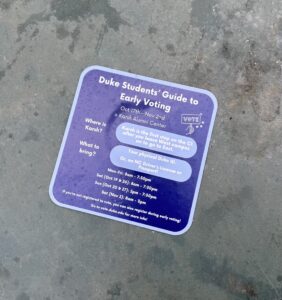
Leaders of political groups on campuses across the state, like Pembele, have tried to combat this issue by exposing the members of their groups to as many candidates as possible through voter education efforts.
“Voting all the way down-ballot is something that I think Democrats struggle with more than Republicans, and when I ask people, the main thing they say is, ‘oh, I don’t know who they are, so I’m not going to vote for them,’” Pembele said. “Now you have no excuse, because I brought them.”
A couple of hours away at UNC, Matthew Trott, president of their Young College Republicans group, has also made it a priority to bring out candidates ahead of the election and educate voters.
“The aspect of our Get Out The Vote initiative that I’m most proud of was our candidate series, where we had six of our ten Council of State candidates come and speak to us,” said Trott. “Additionally, we’ve been out tabling in the middle of the campus in the pit several times each week for the last at least three weeks and intermittently before that, just handing out Republican literature.”
Early voting in North Carolina ended on Saturday at 3:00 p.m., so the next opportunity for students to vote will be on Election Day.
North Carolina is one of 12 states that close the polls before 8:00 p.m., meaning the results will be some of the first to come in.

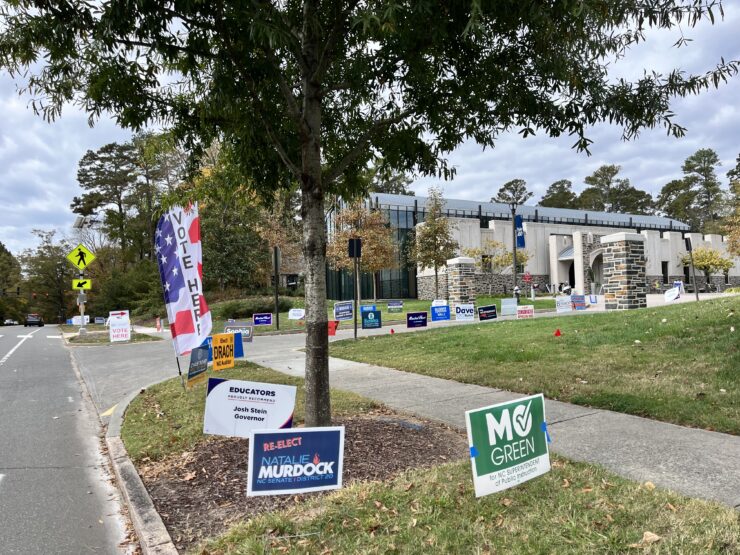
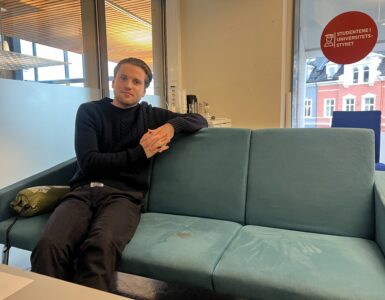
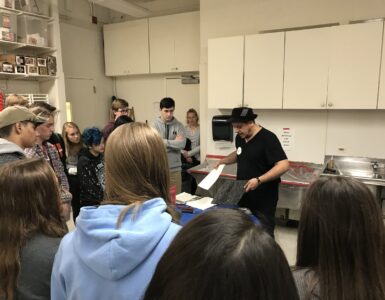
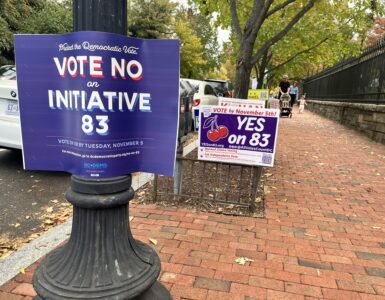










Add comment